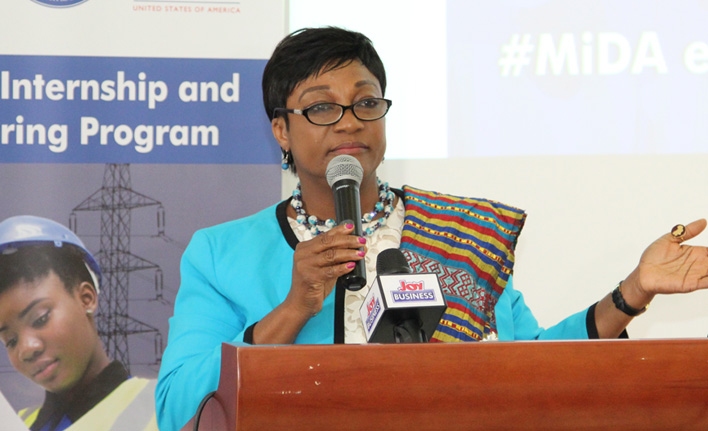 procurement opportunities
procurement opportunities
 documents and reports
documents and reports
POWER COMPACT SUPPORTS FIRST GROUP OF 50 FEMALE STUDENTS ON INTERNSHIP AND MENTORING PROGRAM

Female students pursuing courses in Science, Technology, Engineering and Mathematics (STEM) at various Ghanaian institutions on Wednesday begun a two month pilot internship and mentoring programme sponsored under the Ghana Power Compact. The first cohort of interns consist of 50 students out of which 42 have been engaged by the Electricity Company of Ghana (ECG), two by the Ghana Standards Authority (GSA) and six by the Energy Commission (EC).
The internship, referred to as the Ghana Power Compact Internship and Mentoring Programme (GPCIMP), is expected to support female STEM students acquire relevant and practical skills that will prepare them for career jobs in the power sector. The students have been drawn from the Kwame Nkrumah University of Science and Technology (KNUST), Accra Technical University, Koforidua Technical University, Kumasi Technical University and Akwatia Technical Institute.
At the launch of the internship programme, Minister for Gender, Children and Social Protection, Hon. Otiko Djaba applauded the initiative and pledged her Ministry’s support. “Indeed this is one of several pathways that would lead to a common goal. I am happy to note that MiDA intends to explore partnerships with stakeholders working to achieve the same goal” she said. The Minister encouraged the females to take advantage of the internship opportunity. “Consider yourselves as ambassadors for this programme because your experiences will form useful lessons for all of us” she said.
Dr. Cherub Antwi-Nsiah, Director Gender and Social Inclusion at MiDA, explained that the initiative will help address the incidence of low female enrolments in STEM courses, which often is as a result several factors such as (i) low participation of girls in science-related courses at secondary and below levels (ii) traditional beliefs and attitudes about women’s roles in society that encourages gender-based segregation of professions and does not encourage girls and women to venture into STEM education, (iii) lack of role models, (iv) perception of society that dictates women cannot be engineers because they don’t have the physical strength to perform the job, (v) societal beliefs and attitudes about girls’/women’s inability to perform well in science and math courses, (v) lack of awareness and guidance about career options in STEM, (vi) societal perceptions that portray STEM education and career as male preferred discipline.
The GPCIMP is one of several activities recommended in the Social and Gender Integration Plan (SGIP) which was launched in October 2017. The SGIP provides a blueprint on how to improve social inequalities in Ghana’s power sector.
Newsletter
- 2nd December, 2019MiDA Newsletter, Vol 3 Issue 2
- 29th March, 2019MiDA Newsletter, Vol 3 Issue 1
- 30th September, 2018MiDA Newsletter, Vol 2 Issue 4
- 29th June, 2018MiDA Newsletter, Vol 2. Issue 3
- 30th March, 2018MiDA Newsletter, Vol. 2 Issue 2
- 29th December, 2017MiDA Newsletter, Vol. 2 Issue 1
- 30th June, 2017MiDA Newsletter, Vol.1 Issue 4
- 16th December, 2016MiDA Newsletter, Vol.1 Issue 3
- 30th June, 2016MiDA Newsletter, Vol.1 Issue 2
- 1st February, 2016MiDA Newsletter, Maiden Edition
Stakeholder Consultations
Workshops
- 22nd March, 2017MiDA/MCC PROCUREMENT GUIDELINES WORKSHOP HELD
- 9th September, 2015SECOND POLICY DECISION MAKERS WORKSHOP FOR PSP TRANSACTION IN ECG
- 1st January, 1970Development and Enforcement of Standards and Labels Activity
- 1st January, 1970Improved Energy Auditing Activity
- 1st January, 1970Education and Public Information Activity
- 1st January, 1970Demand Side Management Infrastructure Activity
 Outreach
Outreach
